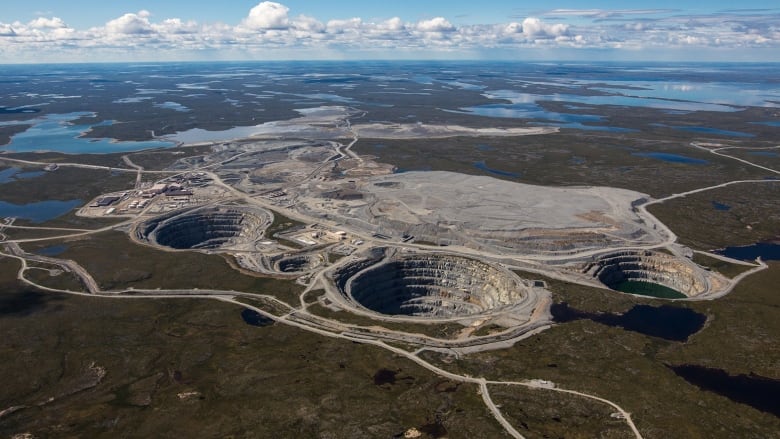Rio Tinto not interested in any part of Dominion Diamond Mines
Sept. 7 set as deadline for identifying successful bidder for cash-starved diamond company

The company thought to be the most logical to partner with or purchase Dominion Diamond Mines is not interested in the troubled diamond company.
In a recent affidavit, former Dominion CEO and former N.W.T. cabinet minister Brendan Bell says Dominion's partner in the Diavik diamond mine — Diavik Diamond Mines Inc., a subsidiary of global mining giant Rio Tinto — is the most obvious candidate to purchase Dominion's 40 per cent stake in the Diavik diamond mine and also to purchase the Ekati mine, which Dominion owns 90 per cent of.
Dominion is in the process of restructuring or being sold, having been granted creditor protection in April.
The company says the COVID-19 pandemic choked off its cash flow leaving it unable to meet loan payments and other obligations, such as covering 40 per cent of the cost of operating the Diavik mine.
In his June 12 affidavit, Bell said with Diavik just 40 kilometres from Ekati, there's an opportunity to combine operations as well as reclamation activities to reduce costs.
But, said Bell, Diavik Diamond Mines Inc. "has expressed to the [Alberta Court of Queen's Bench overseeing Dominion's restructuring] that it is not a bidder for [Dominion's] interest in the Diavik mine or the Ekati mine."
Last month Dominion filed a lawsuit against Diavik Diamond Mines Inc., alleging it is mismanaging the Diavik mine and intentionally starving Dominion of cash at a time when its cash flow has been cut off. Dominon shut down Ekati when the COVID-19 pandemic hit, but Diavik continues to operate.
In his affidavit, Bell said he has been told by a company that is providing Dominion with financial advice through the restructuring that only two businesses have signed non-disclosure agreements. Those agreements are required to get proprietary information about Dominion, that could lead to a bid for some or all of its assets.
The two parties are not identified. They are in addition to a bid being advanced by a subsidiary of The Washington Companies, which owns Dominion, and interest expressed by Dominion's biggest lenders.
According to the latest report of the monitor overseeing the restructuring, a process for soliciting investors or selling off Dominion's assets has been finalized.
It sets July 20 as the deadline for non-binding letters of intent from interested parties and Sept. 7 as the deadline for selecting the successful bidder.
The bid being advanced by the Washington subsidiary is known as a stalking horse bid — an initial bid for Dominion's assets that sets a minimum price for the company. In addition to the $126 million bid, the Washington Companies has agreed to provide $60 million in short-term financing to keep it operating through the restructuring.
Dominion's creditor protection has been extended to Sept. 28.